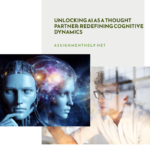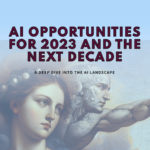The Importance of AI Ethicists & How to Become One
In an era marked by rapid technological advancements, the significance of artificial intelligence (AI) has reached unprecedented heights. However, alongside the sophistication and autonomy of these systems, a myriad of ethical concerns has surfaced, demanding deliberate attention and proactive measures. At the forefront of addressing these issues stands the AI ethicist.

As AI systems evolve in complexity and impact, there’s a burgeoning demand for roles dedicated to AI ethics. Professionals in this field merge technical proficiency with a profound grasp of AI’s ethical, social, and legal ramifications. Recognized increasingly as a critical priority for organizations, the AI ethicist is tasked with steering ethical practices in both the development and deployment of AI. Dive deeper into understanding who these specialists are, grasp the pivotal role they play in our AI-centric world, and navigate the pathway toward expertise in this specialized domain.
Why Are Ethics Important in AI?
The integration of AI across diverse sectors has amplified the significance of ethical considerations. Here’s why dedicated AI ethicists are indispensable for businesses in navigating this landscape:
Guiding Ethical Development:
AI ethicists act as architects of responsible AI development. They’re instrumental in embedding ethical considerations into the very fabric of AI design. By integrating ethical principles at the onset, they ensure that AI isn’t just about technological advancement but also about responsible innovation.
Alignment with Societal Values:
One of the critical roles of AI ethicists is to prevent biases and discriminatory behaviors within AI systems. By scrutinizing data and algorithms, they strive to eliminate biases that could lead to unfair or discriminatory outcomes. Their goal is to ensure that AI systems reflect the ethical and moral fabric of society.
Compliance and Standards:
Navigating the complex regulatory landscape surrounding AI requires expertise. AI ethicists help organizations understand and comply with existing regulations and standards. Moreover, they contribute insights to policymakers for creating future AI-related guidelines. This proactive engagement ensures that AI development operates within legal boundaries.
Legal Frameworks and Best Practices:
Beyond regulatory compliance, ethicists ensure adherence to legal frameworks and industry best practices. This proactive stance safeguards organizations from legal risks and upholds their reputation by ensuring ethical AI practices.
Risk Mitigation:
AI, if misused, can pose substantial risks. AI ethicists play a pivotal role in identifying and mitigating these risks. By foreseeing potential dangers, they aid in creating robust safeguards, making AI deployment safer and more responsible.
Early Ethical Intervention:
AI ethicists serve as ethical watchdogs, flagging potential concerns before they escalate. This proactive stance allows organizations to address ethical dilemmas preemptively, averting potential harm and controversy.
In essence, AI ethicists act as guardians of AI’s moral compass. Their multifaceted role encompasses ethical guidance, societal alignment, compliance, risk mitigation, and proactive ethical intervention, ensuring that AI serves humanity responsibly and ethically.
What Is an AI Ethicist?: Their Role, Responsibilities and Impact Within an Organization
An AI ethicist is a professional specializing in the ethical dimensions of AI development and implementation. This role, often integrated into AI development teams or housed within corporate responsibility departments, focuses on ensuring that AI is developed and utilized responsibly, benefiting all stakeholders involved.
Key Responsibilities:
1. Crafting Ethical Guidelines and Policies:
AI ethicists are tasked with creating comprehensive guidelines and policies that direct the responsible development and deployment of AI. These documents serve as foundational principles guiding ethical AI practices within the organization.
2. Setting Standards for Responsible AI Development:
They establish standards to ensure that AI development aligns with ethical principles and societal norms. These standards encompass fairness, transparency, accountability, and inclusivity in AI systems.
3. Conducting Ethics Reviews:
Before an AI project is implemented, ethicists conduct thorough ethics reviews. These assessments identify potential ethical issues within the AI system and propose remedies to mitigate any risks or biases.
4. Evaluating Ethical Risks and Ensuring Compliance:
AI ethicists actively evaluate and address potential ethical risks associated with AI projects. They ensure compliance with existing ethical guidelines, regulations, and legal frameworks to mitigate potential harm.
5. Collaboration Across Teams:
Working closely with diverse teams including developers, product managers, legal experts, and other stakeholders, AI ethicists integrate ethical considerations at every stage of AI development. This collaboration ensures that ethical principles are woven into the fabric of the AI system.
6. Educating and Advocating Ethical Practices:
AI ethicists play a crucial role in educating and raising awareness among team members about ethical AI practices. By fostering a culture of responsibility and ethical consciousness, they promote adherence to ethical guidelines and encourage ethical decision-making.
Impact Within an Organization:
- Ethical Innovation: AI ethicists guide the organization towards innovative AI solutions that are ethically sound and aligned with societal values.
- Risk Mitigation: Their proactive approach in identifying and addressing ethical risks safeguards the organization from potential harm and legal ramifications.
- Compliance and Reputation: By ensuring adherence to ethical standards and legal frameworks, ethicists help maintain the organization’s reputation and credibility.
- Cultural Shift: Through education and advocacy, they contribute to a cultural shift within the organization, fostering a commitment to ethical practices in AI development and deployment.
AI ethicists hold a pivotal role in steering organizations towards ethically responsible AI development. Their multifaceted responsibilities contribute to shaping an ethical framework that guides the organization’s AI endeavors for the benefit of all stakeholders.
Top Skills and Background for AI Ethicists
An AI ethicist’s role demands a special mix of technical prowess, ethical comprehension, analytical insight, and effective communication. This diverse skill set is essential for steering AI development and application, requiring a well-rounded approach to navigate the complexities involved in ensuring responsible AI use.
Multidisciplinary Education:
- Computer Science and AI Technologies: A solid grasp of computer science fundamentals, including AI systems, algorithms, and tools, forms the technical backbone of an AI ethicist’s knowledge.
- Ethics, Philosophy, and Social Sciences: Understanding ethical theories and their application to AI is crucial. Knowledge in social sciences aids in evaluating AI’s societal impact and ethical implications.
2. Analytical and Critical Thinking:
- Analytical Skills: Ability to dissect complex ethical dilemmas in AI and analyze them methodically, enabling the identification of potential risks and development of viable solutions.
- Critical Thinking: Capacity to evaluate situations objectively, considering ethical, social, and technical dimensions, to arrive at well-founded decisions and recommendations.
3. Communication and Collaboration:
- Effective Communication: Clear and concise communication of complex AI ethics concepts to stakeholders with varying levels of technical expertise.
- Collaboration Skills: Ability to work harmoniously with diverse teams, including developers, legal experts, and policymakers, to integrate ethical considerations seamlessly into AI development.
4. Familiarity with Ethics Frameworks and Regulations:
- Understanding Legal Landscape: Knowledge of industry standards, legal requirements, and AI ethics frameworks is crucial. This understanding ensures compliance and informs ethical decision-making throughout AI development.
Background and Experience:
- Education: A background in computer science, ethics, philosophy, social sciences, or related fields provides a foundation for understanding the complexities of AI ethics.
- Experience: Hands-on experience in AI development or ethics-related roles, such as policy development or social impact analysis, helps in practical application and navigating real-world ethical challenges.
Continuous Learning:
- Adaptability and Learning: Given the evolving nature of AI and ethics, an ethicist should possess a commitment to ongoing learning, staying updated on technological advancements and evolving ethical debates in the field.
AI ethicists require a diverse skill set encompassing technical acumen, ethical understanding, analytical prowess, and effective communication. Their multidisciplinary background, combined with experience and continuous learning, equips them to navigate the complex ethical landscape of AI development and deployment.
How to Become an AI Ethicist: From Education to Networking
Starting a career as an AI ethicist involves a blend of formal education, hands-on experience, and active networking. Here’s a roadmap that outlines the general path towards pursuing this goal:
Educational Pathways
Education should ideally span across technical and non-technical fields:
- Undergraduate Degrees in Relevant Areas: Start with a bachelor’s degree in computer science, philosophy, or social sciences. These form the groundwork necessary for grasping AI ethics.
- Master’s Programs Focused on AI Ethics: Pursue a Master’s degree in AI with a concentrated focus on ethics. This specialized education provides in-depth knowledge crucial for this field.
- Tailored Programs Integrating AI and Ethics: Consider programs that merge AI with ethical studies. These specialized courses offer a holistic view of the intersection between AI and ethics.
Gaining Practical Experience
Gaining practical experience is pivotal in becoming an AI ethicist:
- Internships and Co-ops in AI Ethics: These roles offer real-world application of your knowledge.
- AI Ethics Research and Projects: Engage in research or projects centered on AI ethics, expanding your expertise.
- Collaboration with Experienced Researchers: Partnering with seasoned researchers exposes you to intricate ethical challenges and the resolution process, enriching your skill set.
Networking and Professional Development
Networking and staying updated are essential in this field:
- Membership in AI Ethics Groups: Joining forums and organizations dedicated to AI ethics helps you stay updated and connect with peers.
- Participation in Conferences and Workshops: These events are invaluable for learning from leaders and expanding your professional circle.
Remember, every path to becoming an AI ethicist is distinct. Embrace opportunities aligned with your goals and interests, and be proactive in shaping your journey in this dynamic field.
Staying Ahead of Ethical AI Issues for Businesses: Proactive Strategies for Success
In today’s AI-driven landscape, addressing ethical concerns stands as a cornerstone for business success. Proactive strategies centering on a comprehensive ethical framework, nurturing a culture of ethical AI, and ongoing policy evaluations are key to staying ahead.
Implementing an AI Ethics Strategy:
Crafting and executing a robust AI ethics strategy is foundational:
- Identifying Risks: Recognizing potential ethical, legal, and social risks within AI projects allows for proactive mitigation.
- Preserving Trust: Ensuring AI systems are trustworthy and fair is pivotal for sustaining user confidence and nurturing strong stakeholder relationships.
- Mitigating Bias: Strategies aimed at minimizing algorithmic biases pave the way for fairer, more accurate AI systems.
- Establishing Transparency: Clarity in AI processes fosters user and stakeholder comprehension and trust.
- Safeguarding Privacy: Upholding stringent measures to protect user data is crucial for compliance with privacy regulations and maintaining trust.
- Compliance with Regulations: Adhering to legal and industry-specific standards is imperative to steer clear of penalties and ensure ethical operations.
Encouraging a Culture of Ethical AI Development:
Fostering a workplace culture that prioritizes responsible AI practices ensures collective commitment to ethical AI:
- Regular Review and Updating of AI Ethics Policies:
Ethical considerations in AI remain dynamic, evolving alongside technology and societal norms. Regularly revisiting and adapting ethics policies allows businesses to stay in tune with emerging ethical challenges and evolving regulations. This continuous evaluation ensures alignment with ethical standards and regulatory requirements, fostering responsible and ethical AI practices within the organization.
By embracing these proactive strategies, businesses can navigate the ethical complexities of AI, ensuring responsible and ethical AI deployment that aligns with societal values and regulatory expectations.
Embrace the Future of Ethical AI
In the era of AI dominance, ethics have surged to unprecedented prominence. AI ethicists stand at the crossroads of technology and ethics, steering AI practices toward moral, societal, and legal alignment. Their role is pivotal in merging AI advancements with societal values.
The University of San Diego’s online Master of Science in Applied Artificial Intelligence program nurtures aspiring individuals in this field, cultivating the next generation of AI ethicists poised to infuse AI with humanity, justice, and responsibility.
For those considering this career path, the eBook, “8 Questions to Ask Before Selecting an Applied Artificial Intelligence Master’s Program,” offers invaluable insights for making informed educational choices. As AI’s trajectory hinges on ethical stewardship, the role of AI ethicists in shaping this future is paramount. Embark on this journey today.
Citations:
Assignment Help. (2023). Understanding the Age of AI: A Comprehensive Study Material. https://www.assignmenthelp.net/document/2-1-2-case-studies-of-companies-benefiting-from-network-and-lea/64f85132f7fc18cabe00b963
Borenstein, J., & Howard, A. (2020). Emerging challenges in AI and the need for AI Ethics Education. AI and Ethics, 1(1), 61–65. https://doi.org/10.1007/s43681-020-00002-7
Dubber, M. D., Pasquale, F., & Das, S. (2021). The Oxford Handbook of Ethics of Ai. Oxford University Press.
Gambelin, O. (2020, October 6). Brave: What it means to be an AI ethicist – ai and Ethics. SpringerLink. https://link.springer.com/article/10.1007/s43681-020-00020-5
Hagendorff, T. (2022). Ai Ethics and its pitfalls: Not living up to its own standards? AI and Ethics, 3(1), 329–336. https://doi.org/10.1007/s43681-022-00173-5


